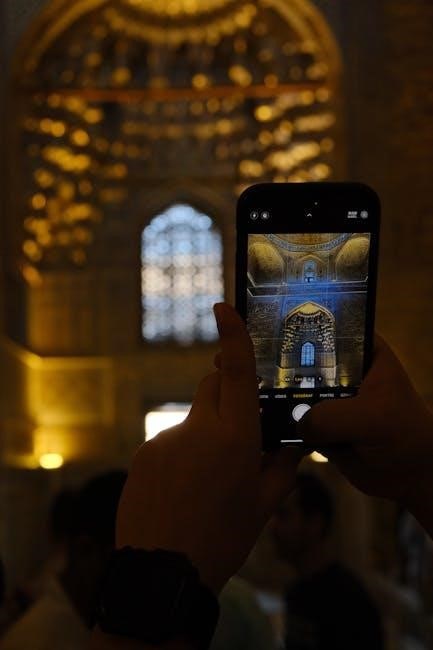Elie Wiesel’s Night is a poignant memoir recounting his Holocaust experiences. Its vivid narrative and emotional depth make it a cornerstone of Holocaust literature, offering a personal and universal story.
The book’s availability in PDF format ensures accessibility for readers worldwide, preserving Wiesel’s testimony for future generations and fostering education on the Holocaust’s atrocities and human resilience.
1.1 Brief Overview of the Book
Night by Elie Wiesel is a haunting memoir chronicling his Holocaust experiences. The book recounts his journey from Sighet to Auschwitz, detailing the atrocities and emotional turmoil he endured. Wiesel’s narrative explores themes of faith, hope, and humanity, offering a deeply personal yet universally resonant account. Its vivid prose and unflinching honesty make it a crucial work in Holocaust literature. The availability of Night in PDF format ensures its accessibility, allowing readers to engage with Wiesel’s powerful testimony and reflect on its historical and emotional significance. This memoir remains a vital educational resource, preserving the horrors of the Holocaust for future generations.
1.2 Importance of the Book in Holocaust Literature
Night stands as a seminal work in Holocaust literature, offering a raw, firsthand account of the atrocities committed during World War II; Elie Wiesel’s testimony provides an unflinching look at the horrors of concentration camps, making it a cornerstone of historical understanding. Its emotional depth and vivid storytelling have captivated readers, ensuring its place in the canon of Holocaust narratives. The book’s availability in PDF format has furthered its reach, educating countless individuals about the Holocaust’s impact on individuals and humanity. Wiesel’s work not only honors the victims but also serves as a powerful warning against indifference and injustice, fostering empathy and awareness across generations.

Historical Context of the Holocaust
The Holocaust occurred between 1941 and 1945, marking the systematic persecution and extermination of six million Jews by the Nazis. Night captures Elie Wiesel’s personal story, reflecting the broader horrors of this dark period. The PDF format ensures accessibility, preserving this vital historical account for future generations.
2.1 The Holocaust: A Historical Background
The Holocaust, a genocide during World War II, systematically targeted Jews, Roma, disabled individuals, and others deemed undesirable by the Nazi regime. Between 1941 and 1945, approximately six million Jews were murdered. The persecution began with anti-Semitic laws and escalated to concentration camps like Auschwitz, where mass exterminations occurred. Key events included Kristallnacht (1938) and the Final Solution (1942). Liberation by Allied forces in 1944-1945 exposed the atrocities. Night’s PDF format ensures this history remains accessible, preserving the memories of victims and survivors for educational purposes, highlighting the importance of remembering this dark chapter in human history to prevent future atrocities.
2.2 Elie Wiesel’s Personal Experiences During the Holocaust
Elie Wiesel’s harrowing Holocaust journey began in 1944 when Nazis invaded his hometown, Sighet. At 15, he and his family were deported to Auschwitz, where his mother and younger sister were immediately killed. Separated from his father, Wiesel endured forced labor and witnessed unimaginable horrors. His father later died in Buchenwald. Wiesel’s memoir, Night, chronicles these experiences, offering a raw, emotional account of survival and loss. The PDF version of the book preserves his testimony, ensuring that his story and the atrocities he witnessed are never forgotten, serving as a vital educational resource for understanding the Holocaust’s personal and historical impact.
Literary Themes in Night
Night explores themes of faith crisis, innocence loss, and humanity’s indifference. Wiesel’s memoir captures the emotional and psychological turmoil of Holocaust survivors, resonating deeply in its PDF format.
3.1 The Struggle with Faith and God
Central to Night is Elie Wiesel’s grappling with faith amidst unimaginable suffering. The PDF version vividly captures his internal conflict, questioning God’s silence during the Holocaust. Wiesel’s journey from devout belief to spiritual despair reflects the theological struggles of many survivors, highlighting the shattering of innocence and the search for meaning in a world that seemed devoid of divine intervention. This theme resonates profoundly, making Night a powerful exploration of faith, doubt, and humanity’s quest for understanding in the face of atrocities. The digital format ensures these poignant reflections remain accessible and impactful for readers globally.
3.2 The Loss of Innocence and Hope
Night profoundly explores the erosion of innocence and hope through Elie Wiesel’s harrowing Holocaust experiences. The PDF version captures the devastating transformation from a young boy’s optimism to utter despair. Witnessing unimaginable atrocities, Wiesel’s faith in humanity crumbles, mirroring the loss of innocence shared by countless victims. The memoir vividly portrays the psychological toll of concentration camps, where hope fades as survivors confront unimaginable suffering. This theme resonates deeply, as Wiesel’s story becomes a universal testament to the fragility of hope in the face of extreme adversity, leaving readers with a haunting reflection on humanity’s capacity for cruelty and resilience. The digital format ensures this powerful narrative remains accessible and poignant for future generations.
3.3 The Indifference of Humanity
Night by Elie Wiesel starkly illustrates the chilling indifference of humanity during the Holocaust. The PDF version captures Wiesel’s haunting observations of bureaucratic apathy and societal detachment. The memoir recounts how ordinary people, including some Jewish leaders, failed to act against the escalating atrocities, embodying a collective numbness. Wiesel’s experiences in Auschwitz reveal the dehumanizing effects of indifference, as prisoners were treated as mere numbers rather than lives. This theme underscores the moral failure of individuals and systems that turned away from suffering, leaving victims to endure unimaginable horrors. The digital format ensures this critical reflection on humanity’s capacity for indifference remains accessible, urging readers to confront uncomfortable truths about complicity and silence in the face of evil.

Elie Wiesel’s Personal Journey
Elie Wiesel’s journey began in Sighet, Romania, where he was born into a Jewish family. The Nazi invasion in 1944 shattered his childhood, forcing him into Auschwitz and later Buchenwald. His experiences during the Holocaust profoundly shaped his identity and worldview. The PDF of Night vividly captures his emotional and psychological struggles, offering a raw account of survival and loss. Wiesel’s story transcends his personal trauma, becoming a universal testament to resilience and the human spirit. His journey from darkness to advocacy underscores his enduring legacy as a Holocaust survivor and Nobel laureate.
4.1 From Sighet to Auschwitz: Wiesel’s Story
Elie Wiesel’s harrowing journey began in Sighet, Romania, where he was born into a devout Jewish family. In 1944, at just 15 years old, his life was forever altered when the Nazis invaded. He and his family were deported to Auschwitz, where they were separated. Wiesel was forced to endure unimaginable horrors, including the death of his mother and younger sister. The PDF of Night chronicles his initial experiences in Auschwitz, detailing the brutal conditions and the psychological trauma he faced. His story is a testament to the atrocities of the Holocaust and the resilience of the human spirit.
4;2 The Psychological and Emotional Toll of the Holocaust
Elie Wiesel’s memoir Night vividly captures the profound psychological and emotional trauma he endured during the Holocaust. The loss of his family, the brutality of the concentration camps, and the dehumanizing conditions left lasting scars. Wiesel’s faith was deeply shaken, leading to a spiritual crisis that permeates the narrative. The PDF of Night reveals his internal struggle to reconcile his beliefs with the atrocities he witnessed. The Holocaust’s emotional toll is evident in his descriptions of despair, hopelessness, and the erosion of innocence. Wiesel’s story serves as a poignant reminder of the enduring impact of such trauma on individuals and humanity as a whole.

The Book’s Structure and Style
Night is structured as a memoir, with a straightforward, haunting narrative. Wiesel’s tone is somber and reflective, using direct language to convey the horrors he witnessed, creating a powerful, emotional impact that resonates deeply in its PDF format.
5.1 Narrative Style and Tone
Elie Wiesel’s Night employs a direct, haunting narrative style, blending vivid imagery with somber tones. The memoir’s straightforward structure mirrors the stark reality of the Holocaust, while Wiesel’s tone shifts from despair to resilience. His use of simple, powerful language enhances the emotional impact, making the atrocities he witnessed deeply personal. The PDF format preserves this narrative integrity, ensuring the text remains accessible and unaltered. Wiesel’s reflective voice underscores the psychological and emotional toll, creating a profound connection with readers. The tone, often raw and unflinching, reflects the horrors experienced, yet maintains a dignity that honors the victims’ memories.
5.2 Symbolism in Night
In Night, Elie Wiesel uses profound symbolism to convey the horrors of the Holocaust. Darkness and night symbolize the moral and spiritual void, while fire represents destruction and the crematoria. The loss of faith is mirrored in the absence of light, reflecting the theological struggles. The PDF format preserves these symbols, ensuring their emotional weight remains intact. Wiesel’s use of silence and speechlessness underscores the inability to articulate the unimaginable atrocities. These symbols evoke a visceral response, making the Holocaust’s atrocities relatable and unforgettable. The interplay of these elements reinforces the book’s themes of despair, hopelessness, and the dehumanization of victims.

Impact on Holocaust Awareness
Night has profoundly shaped Holocaust awareness, serving as a raw, personal testimony. Its availability in PDF ensures widespread accessibility, educating generations about the atrocities and promoting remembrance globally.
6.1 Night as a Testimony to the Holocaust
Night stands as a powerful testimony to the Holocaust, offering a deeply personal account of Elie Wiesel’s experiences. Its vivid descriptions of life in concentration camps provide an unflinching look at the atrocities committed during this dark period. The book’s emotional honesty and raw narrative have made it a crucial document in understanding the Holocaust’s impact on individuals and communities. By chronicling his journey through Auschwitz and Buchenwald, Wiesel ensures that the voices of the victims are not forgotten. The availability of Night in PDF format has further amplified its reach, making this essential testimony accessible to a global audience.
6.2 The Book’s Role in Educating Future Generations
Night plays a vital role in educating future generations about the Holocaust, serving as a first-hand account of its horrors. Its inclusion in school curricula worldwide ensures that young readers grasp the historical significance and moral lessons of the Holocaust. The availability of Night in PDF format has made it easier for educators to incorporate the book into classrooms, facilitating discussions on tolerance, humanity, and the dangers of indifference. By sharing Wiesel’s story, the book fosters empathy and understanding, ensuring that the Holocaust’s legacy is not forgotten. Its educational impact continues to inspire critical thinking and reflection among students globally.
Educational Significance
Night in PDF enhances accessibility, making it a key educational tool for understanding the Holocaust and promoting tolerance, ensuring Wiesel’s powerful story reaches learners worldwide effectively.
7.1 Teaching Night in Schools
Teaching Night in schools is crucial for educating students about the Holocaust and its profound impact on humanity. The availability of Night in PDF format makes it easily accessible for classroom use, allowing teachers to assign readings and facilitate discussions effectively. The book’s vivid narrative provides a personal perspective on historical atrocities, fostering empathy and understanding. Educators often use Night to explore themes of hope, faith, and resilience, making it a valuable resource for curriculum development. Its inclusion in school programs ensures that future generations learn from Wiesel’s experiences, promoting tolerance and awareness of human rights issues. The PDF format enhances accessibility, enabling widespread educational impact.
7.2 Study Guides and Resources for Night
Study guides and resources for Night are widely available to enhance understanding of the book. Many of these resources are accessible in PDF format, making them easy to download and use. They include chapter summaries, discussion questions, and historical context to deepen students’ engagement with Wiesel’s story. Educators often utilize these materials to create lesson plans and activities that align with curriculum goals. Additionally, online platforms offer interactive study guides and printable worksheets, providing a comprehensive learning experience. These resources complement the PDF version of Night, ensuring that readers can fully grasp the book’s themes and significance in Holocaust education.

Availability as a PDF
Night by Elie Wiesel is widely available in PDF format, making it easily accessible for readers worldwide. This digital version preserves the book’s original content, ensuring its educational convenience and broad reach.
8.1 Sources for Downloading the PDF
The PDF of Night by Elie Wiesel can be accessed through various reputable sources. Platforms like archive;org and Google Books offer the full text for educational purposes. Additionally, many academic and literary websites provide direct downloads, ensuring accessibility for students and researchers. Some sources include the 2006 translation of the book, maintaining its original emotional impact. File sizes typically range from 87.9MB to 1616kb, depending on the version. These sources are widely trusted, making it convenient for readers to engage with Wiesel’s powerful testimony digitally. Always ensure downloads are from verified sites to maintain quality and safety.
8.2 The Convenience of Digital Formats
The PDF format of Night by Elie Wiesel offers unparalleled convenience for readers. Digital versions enable easy access across devices, including smartphones, tablets, and e-readers. The portability of the file allows readers to engage with Wiesel’s powerful narrative anytime, anywhere. Features like search, bookmarking, and adjustable font sizes enhance readability. Digital formats also facilitate sharing and storage, making it simple to revisit key passages or discuss the book in educational settings. This accessibility ensures that Wiesel’s message reaches a broader audience, preserving its impact for future generations. The convenience of digital formats underscores the enduring relevance of Night in modern times.
Reception and Reviews
Night by Elie Wiesel has received critical acclaim for its raw, emotional portrayal of the Holocaust. Readers worldwide have praised its profound impact, calling it a haunting yet essential read.
9.1 Critical Acclaim and Awards
Night by Elie Wiesel has garnered widespread critical acclaim for its unflinching portrayal of the Holocaust. The memoir earned Wiesel the Nobel Peace Prize in 1986, solidifying its global impact. Critics praise its raw honesty and emotional depth, calling it a masterpiece of Holocaust literature. The book’s vivid narrative has resonated with readers worldwide, making it a timeless classic. Its availability in PDF format has further expanded its reach, ensuring future generations can access this vital testimony. Wiesel’s work continues to inspire reflection and education, cementing its place as a cornerstone of historical and literary significance.
9.2 Reader Responses and Emotional Impact
Readers worldwide have been deeply moved by Night, often describing it as a visceral and profoundly emotional experience. The memoir’s raw honesty evokes strong reactions, from shock to profound empathy. Many find Wiesel’s account of the Holocaust both haunting and enlightening, as it humanizes the unimaginable atrocities. The PDF format has made the book more accessible, allowing readers to engage with Wiesel’s testimony digitally. The emotional impact of Night lies in its ability to connect readers to the Holocaust’s horrors while fostering reflection on humanity and resilience. Its universal themes continue to resonate, making it a vital read for understanding history and human nature;

Legacy and Cultural Impact
Night has left an indelible mark on Holocaust literature, shaping global understanding of its atrocities. Elie Wiesel’s legacy extends beyond the book, inspiring advocacy for human rights and justice, while the PDF format ensures its enduring accessibility and educational influence.
10.1 Night’s Influence on Holocaust Literature
Elie Wiesel’s Night stands as a seminal work in Holocaust literature, offering a deeply personal and harrowing account that has reshaped the genre. Its unflinching narrative and emotional depth have inspired numerous authors to share their experiences, creating a ripple effect in the literary world. The availability of Night in PDF format has ensured its accessibility to a global audience, making it a crucial educational resource. This memoir’s influence extends beyond its pages, fostering a deeper understanding of the Holocaust and encouraging discussions on humanity’s darker chapters. Its legacy continues to resonate, solidifying its place as a cornerstone of Holocaust literature.
10.2 Elie Wiesel’s Legacy Beyond Night
Elie Wiesel’s impact extends far beyond his memoir Night. As a Nobel Peace Prize laureate, he dedicated his life to advocating for human rights and combating intolerance. His writings, including over 40 books, address themes of morality and justice. The availability of Night in PDF has spread his message globally, ensuring his legacy as an educator and activist. Wiesel’s influence is evident in Holocaust education and interfaith dialogue, inspiring future generations to confront hatred and promote peace. His work continues to resonate, cementing his role as a moral guide in the modern world.